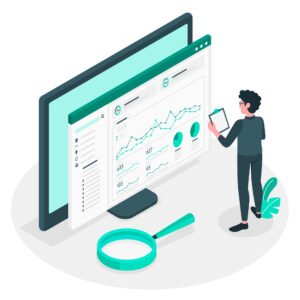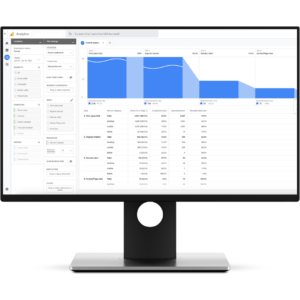Google Analytics 4 Migration
The proficient team at RESULTi has effectively managed the migration and enhancement of over 100 GA4 properties up to this point. Our clientele encompasses diverse sectors such as healthcare, manufacturing, education, finance, logistics, SAAS, and insurance. In essence, there’s hardly any scenario we haven’t encountered.
These varied implementations have ranged from straightforward replication of UA data to more intricate configurations involving comprehensive enhanced e-commerce features, CRM integrations, and reporting through BigQuery.
While our engagements have ranged from large enterprises to smaller businesses, we consistently adhere to a structured process, ensuring our commitment to each property we handle.
Our process begins with a comprehensive assessment of your current Google Analytics setup.
Prior to delving into migration discussions, it’s vital to evaluate your existing GA configuration. We examine your current tracking practices, verify proper settings, and identify areas where additional tracking could be implemented. Often, clients are unaware of the potential for tracking aspects like video analytics, transactions, form submissions, and more using GA4. This deep dive enables us to bridge reporting gaps through meaningful enhancements.
We gather tracking requirements from various stakeholders involved.
In recognition of the multiple teams within the marketing department that rely on GA, we engage all relevant parties. This collaborative approach ensures a comprehensive transition from Universal Analytics (UA) to Google Analytics 4 (GA4). Regular updates and discussions help address data issues and accommodate reporting changes, ensuring everyone can leverage their data optimally.
We build custom reports and dashboards based on your business needs.
These resources facilitate rapid access to valuable insights, catering to your team’s needs. By connecting your data to Looker Studio, we can craft reports that align precisely with your business requirements.
The proper configuration of Google Tag Manager (GTM) is a part of our methodology.
We either establish a new GTM setup or audit an existing container, ensuring seamless functionality of all tags. This practice identifies any tracking gaps related to site performance and crucial metrics, guaranteeing that GTM events fire accurately without impeding site speed.
We equip your team with the skills to optimize GA4 effectively.
Through dynamic reports in Looker Studios (formerly Google Data Studio) and UTM tools, we empower your team to maintain organized and optimized data within GA4. Whether through comprehensive training or internal resources, our aim is to provide the means for you to fully harness your data’s potential.
Staying abreast of the latest GA4 developments, features, and reports is vital.
Our Google Marketing Platform certification grants us access to newsletters and advanced feature insights. This knowledge becomes a guiding force as we navigate your analytics migration and strategize. Moreover, we ensure you stay informed about upcoming changes, enabling your team to plan and adapt proactively.





